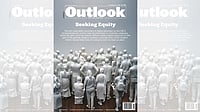A team of US scientists claim to be on the verge of creating an elementary form of life in a laboratory by putting together DNA molecules, and have sought spiritual and legal sanction to go ahead with their experiment.
-News report, Dec 1999
Balls. Thats two of the ten things we can dispense with in the brave neuter world of the imminent future. With do-it-yourself DNA enabling us to create life in a laboratory, we wont have need of appendages which will become as obsolescent as the appendix and the coccyx. Like the state of Marxist prophecy, such hangovers from the past will wither away into extinction. Bye bye, Mrs Bobbit; heres your redundancy pay.
The jettisoning of genitalia will have far-reaching consequences on the biggest and oldest industry in the world. A millennium-friendly, Y2K-compliant Lady Chatterjees Bio-chemist will find few takers among the reading community. While self-appointed CEOs of the industry like Shobha and Khushwant will find ready rehabilitation in appropriate berths in Helpage International, alternative employment will be harder to find for those lower down the sales force line. A streetside offer of Pssst, want some dirty DNA? is unlikely to excite customer frisson, let alone orgasm-whatever that might once have been.
Makers of skin flicks in Hollywood, Bollywood or Malloo Mollywood will be running on empty if the best they can do for an orgy scene is bung in a full frontal shot of an unzipped Y chromosome for the benefit of a somnambulistic audience which watches the non-proceedings with eyes wide shut. Viagra will be consigned to a time capsule, along with Clinton jokes; a test tube-even one made in Havana-remains a test tube, and is no substitute for a good cigar. Particularly one which comes with a big fat Bill at the end of it.
Take away testosterone and investigative journalism will fall by the wayside. Would you buy a future issue of Outlook which featured an expose of couples who swapped cell tissues instead of spouses? Even if each copy came with a free one-year subscription to the editor? Not on your lifestyle. Print media sans editorial cojones makes about as much market sense as a Miss World contest minus oestrogen. Beauty with brains is fine. But how does one fete in articulate amino acid whose avowed ambition in life is to become a professional do-gooder and work for the uplift of the poor and the disadvantaged of the world? Will lab-made Miss Worlds become the permanent-and only-delegates to those international aids conferences from Kathmandu to Kinshasa which no one will go to any more since the all-important question-Can I get it from using a public libertine?-will no longer obtain and whos interested in blood transfusions and infected needles, anyway?
One of the most dispensable casualties of the desexing of civilisation will be the English language, which owes its penetration of the global consciousness to its below-the-belt subtext of raunchy slang. A eunuchoid Angrezi will no longer have to be hataoed; it will hatao itself. More than any language that has ever existed, English has the largest number of synonyms for the act of sexual congress, from the mid-16th century swive to the latter-20th century bonk, with almost 200 variations on the theme in between.
Long before the break of De which made four-letter words the fastest-growing sector in the Indian publishing industry, a disciple asked Bhagwan Shree Rajneeesh (later known as Osho) what he felt about the word f**k. Without batting an id, the sensuous sage replied that it was the most beautiful, expressive and versatile word in the English language. It could be used as a noun, or as a verb, both transitive and intransitive. Suffixed with about, it meant to play around or dally. Followed by off it was an injunction to go away. It could be used as a participle to connote exhaustion. Or as a simple adjective expressing scorn or contempt, or, paradoxically, great approbation. It could be used both as an adverb and adjective to denote a superlative, or as an expression indicative of surprise, consternation, delight, wonder, anger, disgust, dismay, elation and discovery. It could also be used as a purely meaningless qualification, merely for the heck of it.
Rajneeshs mini-sermon on the mount, so to speak, was widely reported and avidly discussed by people who felt he was either an effing genius or an effing fake. But do we really need the services of a godman, true or false, to spell out an obvious fact of life for us? And the fact is that in an age when the English language boasts a comprehensive and cogent vocabulary of some 1,80,000 words, about thrice that of Shakespeares time, when the principles of mathematics have been employed to analyse the form and function of language, when fourth-generation computers chatter away to each other in electronic dialects and satellite telecommunication and the Internet have swamped the ether and cyberspace with a sea of verbal and visual messages, in order to express some of our most profound feelings, so many of us still rely on a worn-out, rudimentary word which sounds like a foot being pulled out of squelchy mud. Why do we so abuse language?
In a recent issue of Maledicta: The International Journal of Verbal Aggression, Dr Reinhold Aman, a Bavarian with a PhD in medieval languages and Americas foremost cursologist, suggests a reason. Noting that swearing is a form of displacement behaviour, like the ritualised aggression found in the animal kingdom (the raising of hackles, baring of teeth, drumming of the chest) which obviates recourse to actual violence, Dr Aman approvingly quotes Freud who said the first human to hurl a curse instead of a weapon was the founder of civilisation.
A philologist has suggested that the reason why English-speaking people use sexual epithets so much, even on occasions when these are ludicrously inappropriate, is that the neuter gender, it, creates a deep verbal repression requiring the catharsis of lubricious language. He is said to have hit upon this theory when he came across two men struggling to change a flat tyre and overheard them employing adjectives for the jack, the spare wheel and the road which, if taken literally, would stymie both the imaginative and physical resources of the most adept of sexual athletes. How could inanimate objects, and inconveniently formed ones at that, generate such venereal vituperation? The reason, he felt, must lie in the fact that the speakers suffered from a profound verbal frustration arising out of using a basically sexless language. He went on to say that in languages like French, which ascribed masculine and feminine genders to objects, there was less of a need for such sexual safety valves.
Ingenious as it is, this theory doesnt explain for the ubiquitous use of sexually-charged language. Though Hindi, for example, dutifully provides masculine and feminine genders for everything from the cradle (masculine) to the grave (feminine), its capable of highly evocative invective. Punjabi and Haryanvi are even more so, as anyone whos exchanged words with a Delhi bus driver-or a quondam deputy PM whose permanent form of address was BC-knows to his cost. The pathological syndrome called coprolalia is a cosmopolitan affliction.
Having bypassed sex, will lab-created life also bypass language, particularly one so reliant on sexual undertones as English? Mulayam Singh Yadav will be on tenterhooks. As will the Acadamie Francaise who cant wait to tell Anglais to eff off, sil vous plait.
But perhaps by far the most disposable phenomena of a lab-fabricated futureworld will be birth and death. If we can put life together like Lego bricks, birth loses its mystery and its miracle. As does its sibling, death. In the eternal, politically correct world of tomorrow these will be no more dead, only the "existentially challenged" who, unlike Humpty Dumpty, can be put together again as and when needed.
Can a humankind which has banished birth and death still retain the magnificent absurdity of its own humanity? Silly question. We lost that a long time ago: in Guernica, Auschwitz, Hiroshima, Gulag, My Lai, Trilokpuri 84, Bombay 93 and Manoharpur, Orissa, 99 where a missionary and his two children were burnt alive in the name of religion. A long time before we even lost our balls.


























